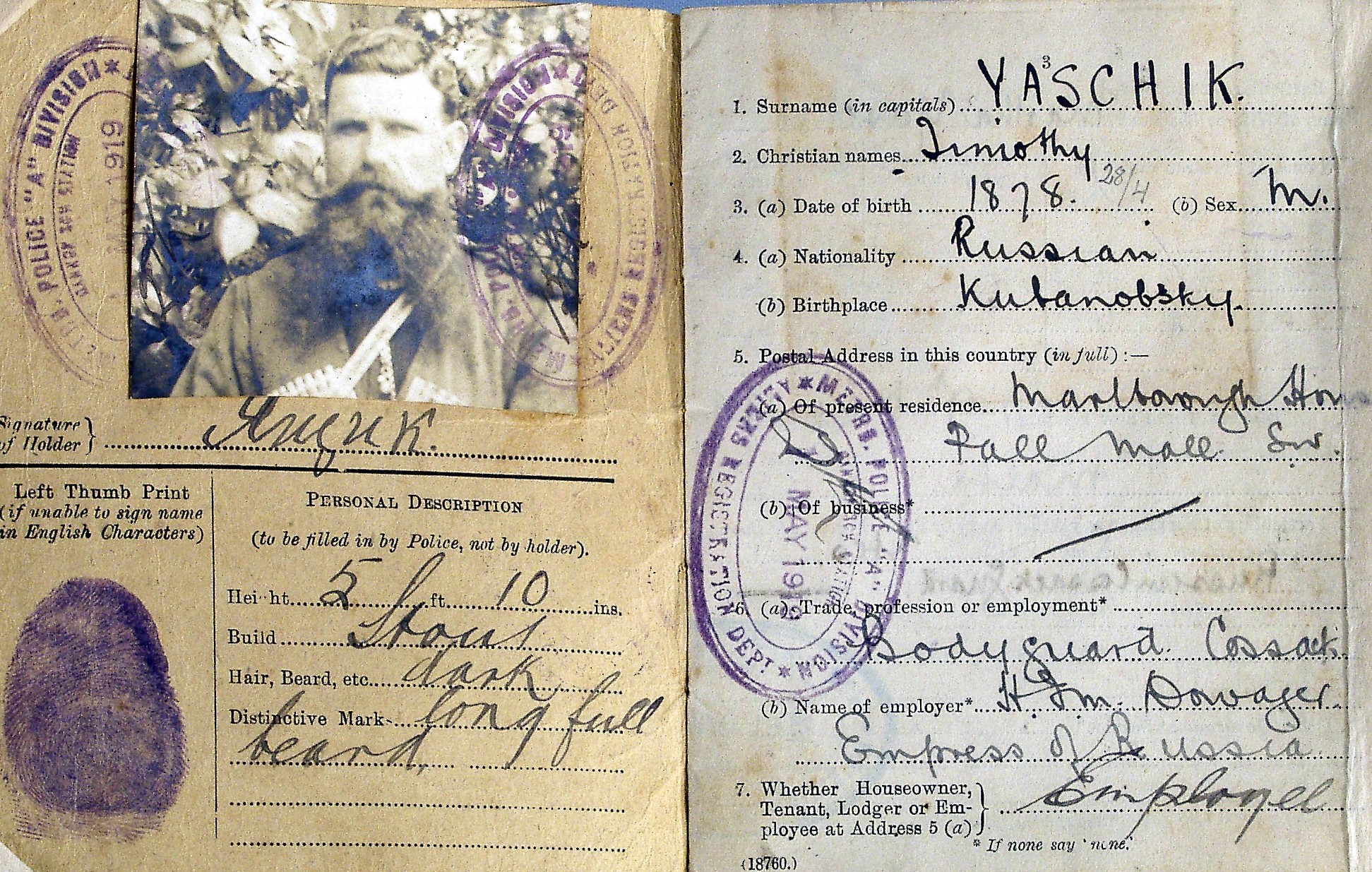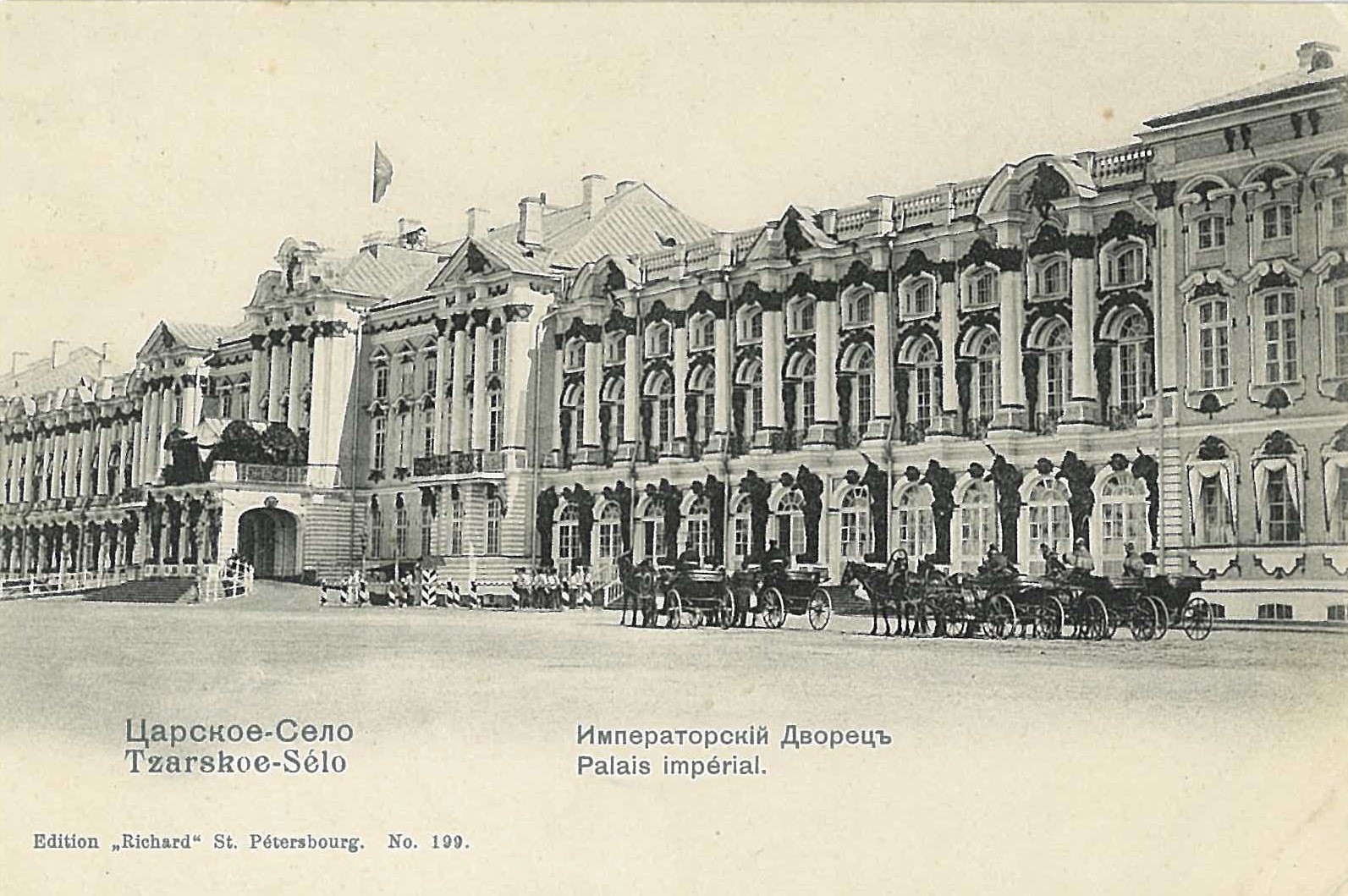Timofei Yaschik
Imperial "Liv-kosak" guard


He was always called “Uncle Tjema” for short in the family. When the Empress Dowager Maria Feodorovna died in 1928, the Cossack Yaschik had to build up a new life in a foreign country. In 1925 he had married the Danish woman Agnes Aabrink. After the Empress had passed away, Yaschik bought a grocer´s shop in Valby, part of Copenhagen. In spite of the fact that he never learned how to speak Danish, Yaschik became a very popular grocer – particularly because he attended his customers dressed in his cossack attire. He was a colourful personality, who often told stories about his adventurous life
Printed as a weekly series, Yaschik told the story of his life to the newspaper Berlingske Tidende in 1941. His memoirs later, in 1942, having been dictated to his wife Agnes in Russian and written down in Danish by her. The articles were published as Yaschik´s memoirs in 1968, although they only comprises his childhood, youth, his years in Imperial service and the period of house-arrest and escape from the Crimean Peninsula. Several of his Danish family relatives accordingly has published and told their recollections of childhood and youth in his company, as well as family-stories told and re-told in the family
Yaschik was born in 1878 in Novo Minskaya, the Kubanovsky region in Caucasus, both parents being from Minsk, Belarus. He had four elder brothers, all of them in Imperial service, and two elder sisters. The year 1900 he entered into military service and left his young wife Marfa Samsonowna Sidorska and a large family back home at his village Novo Minskaya. In 1905 he was transferred from military duties in the Caucasus to Sct. Petersburg, doing actual guard-service in 1913-14. Then, by the Emperor Nicholas´ personal intervention, Yashik was withdrawn from active military service, being appointed to personal first bodyguard for the Emperor himself, then, in December 1915 for the Dowager Empress, a service stretching over nearly 13 years and between two different worlds
Yascik´s childhood and youth meant the hard upbringing of a Kuban-cossack: at the age of four he had his first horse-ride, at the age of six he rode his own horse to school, in later life comparing horse-riding with the bicycles of Danish infants. Yaschik would also be acquired to help in the fields. His best memories from childhood were his farmhouse, the jetty by the riverside, Christmas tree and parties with singing and dancing, including school holidays. Christmas would be spent walking from house to house, singing psalms receiving candy and walking to church celebrations. Food was plentifull, provided you had a farm, the daily diet consisted of pies and porridge, beetroot soup, baked cabbage and potatoes. Yaschik later told that there was only one dentist and one doctor in a region counting more than 14.000 people, toothbrushes were not known, and the weekly bath in wintertime would only be hot throwing cast-away cartridges from recently fired bullets into the bathtub.
At the age of 21, Yaschik began his military-training in Tiflis, the Capital of Georgia, excelling in the use of riffles, then being appointed orderly with the Governor General, Prince Golitsyn. In 1904, Yaschik participated in a military parade in Sct. Petersburg, in the occasion of the recent birth of Imperial couples newly born prince, Aleksei. There and then, he volunteered for service in the Imperial Guard were he would remain for ten years
At the age of 36, Yashik now entered in the personal service of the Emperor, as he became bodyguard Cossack. The Emperor was almost 50, but was still very much physically active. Following in the Emperor´s footsteps would be difficult for the younger Yaschik. Since the duty was so difficult, the Emperor usually changed his personal guard twice a year. Yaschik would be in service around the clock for six months: Following when the Emperor went for his morning stroll, took a horseride (actually it became his duty to collect missing horseshoes when the Emperors horse lost a shoe. Yaschik believed it to be because the Emperor thought horseshoes meant good luck). When the Emperor had an audience, Yaschik would be present in the ante-chamber. When the Emperor went for a drive in a carriage or by smashing car, Yaschik would be there. When the Emperor went to the theater, Yashik would be present in the Imperial box. When the Emperor played tennis, Yaschik would be on the sideline. It also became one of his tasks to carry the young tzarevich Aleksej around in his arms, always assuring the prince that he was not tired, being bathed in sweat from his wollen army coat afterwards. Yaschik would also participate on the famous summer-yachting in the Finnish archipelago and other Imperial traveling. At the outbreak of the First World War, he would stay in the Imperial train, inspecting the front and being close at hand at the visits to Army field hospitals. On these last trips, Yaschik would carry a metal canteen filled with hot chocolate. The unforgettable army-field trip by train in 1914 would be Yashik´s last assignment for Emperor Nicholas II. He then took up military duties at the front, serving in the army, hearing cannon firing from the front, listening to the moanings and screams of wounded soldiers as he helped receiving trains filled with injured men
December 19th 1915, Yaschik received an urgent cable ordering him to report on duty at the residence of the Dowager Empress Maria Feodorovna, present Petrograd. He was being appointed her personal Cossack guard. There were actually three Cossack´s in service attending the Empress, but as Yaschik later stated, the first one was more than 85 years old and now had his “good days”. Yaschik shared in duty with the other Kuban Cossack Kirill Poliakov. The two became inseparable
Their tasks were easy: Due to the war, she rarely went out, and then only for church activities, for celebrations and representational functions. Yaschik would be preoccupied by escorting the Dowager and her Lady-in-waiting the countess Mengden on their occasional visits to the Petrograd hospitals. In May 1916, The Dowager moved her entire household to Kiew and Yaschik went along. Here he participated in the celebrations marking the 50th anniversary of the Empress´arrival in Russia and the wedding of her daughter, the Grand duchess Olga. Yaschik became part of history, as he escorted the Dowager on her voyage by train to the Imperial head-quarters at Moghilev, where he envisaged the total resolution of the Empire and the Emperos´s abdication. Back at Kiew, they received a request from the provisional government to proceed to the Crimean Peninsula
It was during their stay at the Crimean Peninsula, that Yaschik began his routine of sleeping outside the Empress´doors at night, (actually a routine that was upheld to her death in 1928), since they after only a few weeks were subjected to intimidating searchparties, requisitions and confiscations. He now became not only personal guard, but an orderly, seing to her personal needs, trying to ease her days. Each morning he actually made and fetched her breakfast, stirring her eggnog himself, and brewing her coffee, thus making certain nothing was poisoned and after a while, Yaschiks´weapons were confiscated, reducing the proud Cossack to a mere title
Back in Denmark, the Cossack became a familiar face. He moved in at Amalienborg Palace, parading in the Dowagers chambers and in the streets in his old uniform and with his long beard. He actually visited his home-town Novo Minskaya once more. On a secret mission to help the Grand duchess Olga and her family escaping Russia and escorting them to Denmark. Here, he saw his family home, his children and once more experienced his old way-of-life. Grand duchess Olga having remembered her stay at the village, later painted the church at Novo Minskaya and gave it as a present to Yashik. His wife Marfa had been shot as a counterevolutionary in 1917, Yashik continuing all his life in secrecy to send money and letters to his children, even trying to get his youngest child, a son ill with tuberculosis, to Denmark. In 1925, Yaschik remarried with the Danish girl Agnes. Staying at Hvidøre with the Empress, Yashik continued his duties until her very end





According to Yaschik, the Imperial Life Guard concisted of 600 men. One half were Kuban Cossack, the other half were Terek Cossacks. The first years, Yaschik spent his days in the military barracks training and doing his rounds on the Imperial premises. Yaschik would patroll the enormous Tsarskoye Selo. In wintertime, he stated, there would be frosticles in his beard. The title of serving as officer in the Emperor´s private guard was both pratical and honorary. Yashik brought his own equipment, including riffle and ammunition. Wages were low and due to inflation almost without value. Yaschik would be able to spend leave at home, his family would also spend some time in Petersburg in a special property used for Cossack families visiting. Since his duties on guard were spent on foot, and the Cossack traditionally used horses, the Imperial Guards also recquired time on duty for training their skills on horseback, maintained by special competitions. Illustration: Emperor Nicholas II with his Kuban-Cossack guards © Ballerup Museum

From the 2006 exhibition “Empress Maria Fyodorovna and her Imperial court in Denmark”, with present family members representing several generations of Yaschiks danish family, including nieces and nephews













